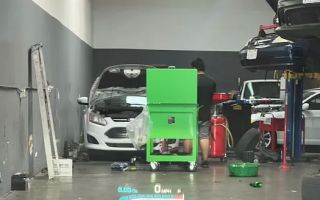- Tools Needed for Fixing a Flat Tire
- Safety Precautions to Consider
- Step-by-Step Guide to Fixing a Flat Tire
- Common Mistakes to Avoid
- When to Call Professionals
Tools Needed for Fixing a Flat Tire
Fixing a flat tire at home is a skill that can save you time and money. To start, you’ll need the proper tools to ensure the repair is done correctly and safely. These tools are essential for a successful DIY tire repair:
- Jack and Jack Stands: These are necessary to lift your vehicle off the ground.
- Lug Wrench: This tool helps you remove the lug nuts securing the tire to the vehicle.
- Spare Tire: A fully inflated spare tire is crucial if you're replacing the flat tire.
- Tire Repair Kit: A kit containing tire plugs, sealant, and other necessary tools can help you temporarily seal the puncture.
- Air Compressor or Tire Inflator: You'll need this to re-inflate the repaired tire to the proper pressure.
- Gloves and Safety Glasses: Protect your hands and eyes while working with potentially sharp objects or tools.
Safety Precautions to Consider
Before beginning any tire repair work, safety should always be your first priority. A few simple precautions can ensure the repair process goes smoothly without injury. Here are some key safety tips:
- Park on a Flat Surface: Always ensure your vehicle is parked on a level surface to avoid instability when lifting the car.
- Use Wheel Chocks: Place wheel chocks on the opposite side of the flat tire to prevent the vehicle from rolling.
- Ensure the Jack is Secure: Double-check that the jack is placed properly and can support the vehicle's weight.
- Keep Tools Organized: Avoid confusion and unnecessary movements by keeping all your tools within easy reach.
Step-by-Step Guide to Fixing a Flat Tire
Now, let's dive into the steps for repairing a flat tire at home. By following this guide, you can address the issue quickly and get back on the road:
- Step 1: Prepare Your Vehicle Start by parking your vehicle on a level, stable surface. Turn on your hazard lights for visibility, especially if you're working on the side of the road. Apply the parking brake to prevent the car from rolling.
- Step 2: Loosen the Lug Nuts Using a lug wrench, slightly loosen the lug nuts on the flat tire. Don’t remove them completely yet; just break their initial tightness.
- Step 3: Jack Up the Vehicle Place the jack under the vehicle’s jacking point, which is usually located near the tire. Lift the car until the flat tire is off the ground, ensuring the vehicle is stable and secure.
- Step 4: Remove the Flat Tire Finish removing the lug nuts and take off the flat tire. Keep the lug nuts in a safe spot so you don’t lose them.
- Step 5: Inspect the Tire Check the flat tire for any visible punctures or damage. If the hole is small and located in the tread area, you can use a tire plug or sealant to repair it. For larger damage, you may need to replace the tire entirely.
- Step 6: Install the Spare Tire Place the spare tire onto the wheel hub and hand-tighten the lug nuts onto the bolts. Lower the vehicle back to the ground carefully.
- Step 7: Tighten the Lug Nuts Once the vehicle is securely on the ground, use the lug wrench to fully tighten the lug nuts in a crisscross pattern to ensure even pressure.
- Step 8: Reinflate the Tire If you repaired the flat tire, use an air compressor or tire inflator to re-inflate it to the recommended pressure. If you installed a spare, check its air pressure and adjust if necessary.
- Step 9: Clean Up and Test Remove all tools, lower the jack completely, and ensure the car is stable. Test the repaired tire by driving slowly in a safe location to check for any issues.
Common Mistakes to Avoid
Even though fixing a flat tire is relatively simple, many DIYers make common mistakes that can cause further damage or lead to unsafe driving conditions. Here are a few to avoid:
- Not Tightening Lug Nuts Properly: Failing to securely tighten the lug nuts can cause the wheel to come loose while driving, leading to potential accidents.
- Using an Incorrect Jack: Using a jack that isn’t rated for the vehicle’s weight can be dangerous. Always check the specifications before using a jack.
- Ignoring Tire Pressure: A repaired tire needs to be properly inflated. Over- or under-inflated tires can affect the car's performance and safety.
- Driving on a Spare Tire for Too Long: Spare tires are meant for temporary use only. Don’t rely on them for long distances or high speeds.
When to Call Professionals
While fixing a flat tire at home is a valuable skill, there are situations where it’s best to call in a professional. If the damage to your tire is too extensive for a repair kit to handle or if you feel uncomfortable performing the repair yourself, don’t hesitate to contact a professional tire service. At Rescue & Towing, we offer expert tire services to help you when you’re in doubt or need assistance right away.
In conclusion, fixing a flat tire at home can be a quick and easy process if you have the right tools, follow the correct steps, and take necessary safety precautions. By doing so, you’ll be able to handle minor tire issues yourself and save money in the process.





























